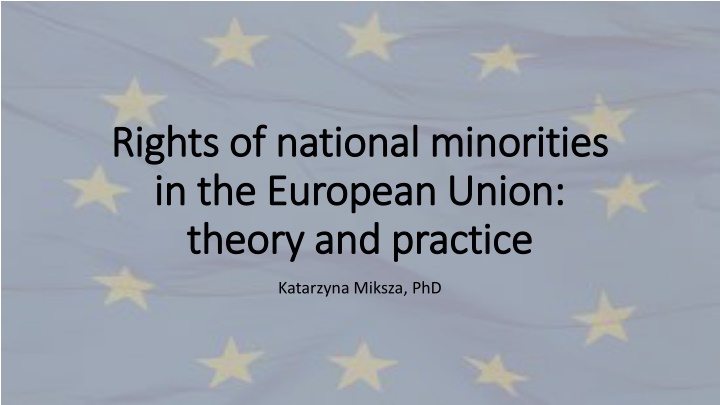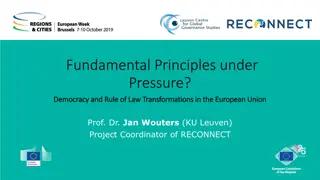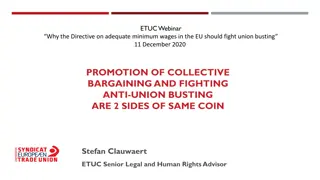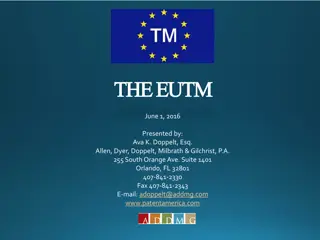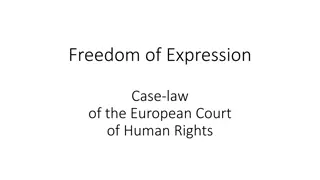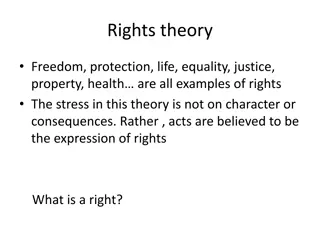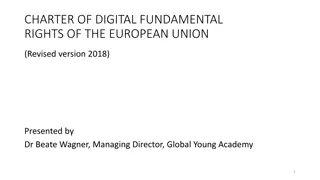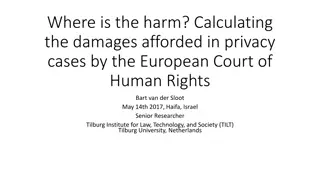Rights of National Minorities in the European Union: Theory and Practice
This content delves into the protection and recognition of the rights of national minorities within the European Union. It covers various aspects such as antidiscrimination efforts, the application of non-discrimination principles, the role of Member States, and the EU's policies on minority rights. Additionally, it explores the context of minority protection in EU enlargement processes and legislative developments pre-Lisbon Treaty.
Download Presentation

Please find below an Image/Link to download the presentation.
The content on the website is provided AS IS for your information and personal use only. It may not be sold, licensed, or shared on other websites without obtaining consent from the author.If you encounter any issues during the download, it is possible that the publisher has removed the file from their server.
You are allowed to download the files provided on this website for personal or commercial use, subject to the condition that they are used lawfully. All files are the property of their respective owners.
The content on the website is provided AS IS for your information and personal use only. It may not be sold, licensed, or shared on other websites without obtaining consent from the author.
E N D
Presentation Transcript
Rights of national minorities Rights of national minorities in the European Union: in the European Union: theory and practice theory and practice Katarzyna Miksza, PhD
Plan 1. Introduction. Provisions of the Treaties 2. The Charter of Fundamental Rights of the European Union 3. Provisions of the EU secondary law 4. Selected policy initiatives at EU level 5. The European Parliament's Committee on Petitions (PETI)
Introductory remarks Protection of minority rights competence of the Member States EU lack of legal competence to develop a single overarching minority protection policy The EU policies on anti-discrimination, regional development, immigration and integration relevant to national minorities as well
Antidiscrimination The fight against discrimination in EU on the basis of ethnic origin is not limited to EU citizens!
The EU national minorities The recognition of the status of minorities solely competence of the Member States Application of the EU principle of non-discrimination doesn t depend on the recognition of the status of minorities In some cases the EU explicitly provides for the needs of persons belonging to national minorities. E.g. So-called Saami Protocol in 1994
Protection of minorities in the context of the EU enlargement 1993 The Copenhagen criteria: political criteria: stability of institutions guaranteeing democracy, the rule of law, human rights and respect for and protection of minorities Apply before accession
Before Lisbon Treaty Since Amsterdam Treaty (entered into force in May 1999) the EU had broad legislative competence combat discrimination based on sex, racial or ethnic origin, religion or belief, disability, age or sexual orientation . Article 13 CJEU: protection of (national) minorities was a legitimate aim of the Member State and their policies (CJEU C-274/96 Bickel and Franz, judgement of 24 November 1998) CJEU C-379/87, Groener, Judgement of 28 November 1989
Innovations introduced by Lisbon Treaty Entered into force on 1stDecember 2009 minorities in the primary law
Article 2 of the Treaty on European Union: The Union is founded on the values of respect for human dignity, freedom, democracy, equality, the rule of law and respect for human rights, including the rights of persons belonging to minorities. These values are common to the Member States in a society in which pluralism, non-discrimination, tolerance, justice, solidarity and equality between women and men prevail The rule deriving from the Treaty establishing Constitution for Europe (Article I-2).
Article 3 It shall respect its rich cultural and linguistic diversity, and shall ensure that Europe's cultural heritage is safeguarded and enhanced.
Charter of Fundamental rights The EU Agency for Fundamental Rights was established in 2007 to provide assistance and expertise relating to fundamental rights to EU institutions, bodies, offices and agencies, and to EU countries when they implement EU law. In 2010, the European Commission adopted a strategy to monitor and ensure the effective implementation of the rights and freedoms enshrined in the charter. The strategy has 3 main objectives: to guarantee that the rights and principles of the charter are correctly taken into account at every step of the legislative process to improve EU citizens' understanding of fundamental rights protection within the EU to monitor the progress of the charter's application through annual reports.
Application of the Charter The Charter applies primarily to the institutions and bodies of the Union (Article 51(1) of the Charter). It therefore concerns in particular the legislative and decision-making work of the Commission, Parliament and the Council, the legal acts of which must be in full conformity with the Charter. Article 51(1) of the Charter also stipulates that the Charter applies to the Member States only when they are implementing Union law. It does not apply in situations where there is no link with Union law .
Limitations of application Fundamental Rights "Check-List" : 1. What fundamental rights are affected? 2. Are the rights in question absolute rights (which may not be subject to limitations, examples being human dignity and the ban on torture)? 3. What is the impact of the various policy options under consideration on fundamental rights? Is the impact beneficial (promotion of fundamental rights) or negative (limitation of fundamental rights)? 4. Do the options have both a beneficial and a negative impact, depending on the fundamental rights concerned (for example, a negative impact on freedom of expression and beneficial one on intellectual property)? 5. Would any limitation of fundamental rights be formulated in a clear and predictable manner? 6. Would any limitation of fundamental rights: - be necessary to achieve an objective of general interest or to protect the rights and freedoms of others (which)? - be proportionate to the desired aim? - preserve the essence of the fundamental rights concerned?
Charter of Fundamental Rights Legally binding document Article 21 Non-discrimination 1. Any discrimination based on any ground such as sex, race, colour, ethnic or social origin, genetic features, language, religion or belief, political or any other opinion, membership of a national minority, property, birth, disability, age or sexual orientation shall be prohibited. 2. Within the scope of application of the Treaties and without prejudice to any of their specific provisions, any discrimination on grounds of nationality shall be prohibited. Article 22 Cultural, religious and linguistic diversity The Union shall respect cultural, religious and linguistic diversity.
Sources of the rights from the Article 21 ECNHR Article 14 UN Treaties Universal Declaration of Human Rights (1948) Article 2 International Covenant on Civil and Political Rights (1966) Article 2 etc. Framework Convention for the Protection of National Minorities (1995) Article 4
Related case-law CJEU - C-122/15, 02/06/2016 (non-discrimination on the grounds of age) As regards, more specifically, the provisions of the Charter which the referring court asks the Court to interpret, suffice it to point out that, according to Article 51(1) of the Charter, its provisions are addressed to the Member States only when they are implementing EU law. It is common ground that Law 1992/1535 does not implement any provision of European Union law and no directive on taxation is applicable in the situation at issue in the main proceedings. Furthermore, as is clear from paragraph 27 of the present judgment, the dispute in the main proceedings does not fall within the scope of Directive 2000/78. Therefore, the provisions of the Charter the interpretation of which is sought by the present request for a preliminary ruling cannot be successfully relied on in the context of that dispute. Having regard to the foregoing considerations, the answer to the first question is that Article 3(1)(c) of Directive 2000/78 must be interpreted as meaning that national legislation, such as that at issue in the main proceedings, relating to a supplementary tax on pension income, does not fall within the substantive scope of that directive nor, therefore, is it covered by Article 21(1) of the Charter.
CJEU CJEU - - C 391/09 / C 391/09 / Judgment Vilniaus miesto savivaldyb s administracija, Lietuvos Respublikos teisingumo ministerija, Valstybin lietuvi kalbos komisija, Vilniaus miesto savivaldyb s administracijos Teis s departamento Civilin s metrikacijos skyrius JudgmentMalgo ata Runevi -Vardyn, ukasz Pawe Wardyn v Article 21 TFEU must be interpreted as: not precluding the competent authorities of a Member State from refusing, pursuant to national rules which provide that a person s surnames and forenames may be entered on the certificates of civil status of that State only in a form which complies with the rules governing the spelling of the official national language, to amend, on the birth certificate and marriage certificate of one of its nationals, the surname and forename of that person in accordance with the spelling rules of another Member State; not precluding the competent authorities of a Member State from refusing, in circumstances such as those at issue in the main proceedings and pursuant to those same rules, to amend the joint surname of a married couple who are citizens of the Union, as it appears on the certificates of civil status issued by the Member State of origin of one of those citizens, in a form which complies with the spelling rules of that latter State, on condition that that refusal does not give rise, for those Union citizens, to serious inconvenience at administrative, professional and private levels, this being a matter which it is for the national court to decide. If that proves to be the case, it is also for that court to determine whether the refusal to make the amendment is necessary for the protection of the interests which the national rules are designed to secure and is proportionate to the legitimate aim pursued; not precluding the competent authorities of a Member State from refusing, in circumstances such as those at issue in the main proceedings and pursuant to those same rules, to amend the marriage certificate of a citizen of the Union who is a national of another Member State in such a way that the forenames of that citizen are entered on that certificate with diacritical marks as they were entered on the certificates of civil status issued by his Member State of origin and in a form which complies with the rules governing the spelling of the official national language of that latter State.
Secondary law The Equality Directives The Framework Decision on combating certain forms and expressions of racism and xenophobia by means of criminal law
Directives Council Directive 2000/43/EC of 29 June 2000 implementing the principle of equal treatment between persons irrespective of racial or ethnic origin (the Racial Equality Directive) Council Directive 2000/78/EC of 27 November 2000 establishing a general framework for equal treatment in employment and occupation. (the Equal Treatment Directive) Directive 2004/38/EC of the European Parliament and of the Council of 29 April 2004 on the right of citizens of the Union and their family members to move and reside freely within the territory of the Member States amending Regulation (EEC) No 1612/68 and repealing Directives 64/221/EEC, 68/360/EEC, 72/194/EEC, 73/148/EEC, 75/34/EEC, 75/35/EEC, 90/364/EEC, 90/365/EEC and 93/96/EEC (Text with EEA relevance) (the Citizens Rights Directive) Council Directive 2003/109/EC of 25 November 2003 concerning the status of third-country nationals who are long-term residents (the Long-term Residents Directive)
The Racial Equality Directive Prohibition of both direct and indirect discrimination on grounds of racial or ethnic groups Article 8 of the directive requires Member States to allow for the burden of proof to be shared between the claimant and the respondent in cases of discrimination, except in Member States where it is for the court or competent body to investigate the facts.
The Equal Treatment Directive Extensive CJEU case-law related to age and disability Eg. C-303/06 Coleman v. Attridge Law C-157/15 Achibita, 14 March 2017.
Citizens Rights Directive (Preambule 31) This Directive respects the fundamental rights and freedoms and observes the principles recognised in particular by the Charter of Fundamental Rights of the European Union. In accordance with the prohibition of discrimination contained in the Charter, Member States should implement this Directive without discrimination between the beneficiaries of this Directive on grounds such as sex, race, colour, ethnic or social origin, genetic characteristics, language, religion or beliefs, political or other opinion, membership of an ethnic minority, property, birth, disability, age or sexual orientation,
Long-term Residents Directive Preambule(5) Member States should give effect to the provisions of this Directive without discrimination on the basis of sex, race, colour, ethnic or social origin, genetic characteristics, language, religion or beliefs, political or other opinions, membership of a national minority, fortune, birth, disabilities, age or sexual orientation.
The Framework Decision on combating certain forms and expressions of racism and xenophobia by means of criminal law The purpose of this Framework Decision is to ensure that certain serious manifestations of racism and xenophobia are punishable by effective, proportionate and dissuasive criminal penalties throughout the European Union (EU). Furthermore, it aims to improve and encourage judicial cooperation in this field. applies to all offences committed: - within the territory of the European Union (EU), including through an information system; - by a national of an EU country or for the benefit of a legal person established in an EU country. To that end, the Framework Decision provides criteria on how to determine the liability of legal persons.
Petitions to the European Parliament Article 227 of the Treaty on the Functioning of the European Union Any citizen, acting individually or jointly with others, may at any time exercise his right of petition to the European Parliament Committee on Petitions and examination of petitions The petitions process is inherently open and transparent. Petitioners are informed at each stage of the petition process, and receive a letter from the Chair informing them of the outcome. The decision on admissibility of a petition is taken by the Committee on Petitions (PETI), which decide what type of action should then follow, according to the Rules of Procedure (Rule 216).
Other documents, policies, initiatives Communication from the Commission to the Council, the European Parliament, the European Economic and Social Committee and the Committee of the Regions of 1 June 2005 Non-Discrimination and Equal Opportunities for All - A Framework Strategy [COM(2005)224 Official Journal C 236 of 24.9.2005]. Minority Safepack Initiative The EU Framework for National Integration Strategies
https://petiport.secure.europarl.europa.eu/petitions/en/petition/con tent/0193%252F2017/html/Petition-No-0193%252F2017-by- Rafa%25C5%2582-Kampa-%2528Polish%2529-on-the-alleged- violation-of-the-principle-of-cultural%252C-religious-and-language- diversity-due-to-the-introduction-of-a-new-administrative-division-of- Poland https://www.youtube.com/watch?v=v7mSDtcz3i4 http://fra.europa.eu/en/charterpedia/article/21-non-discrimination#
